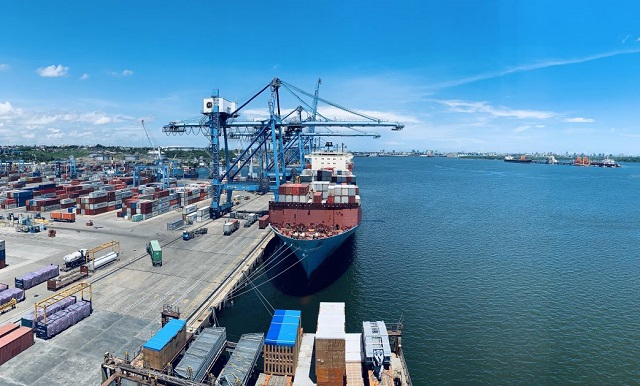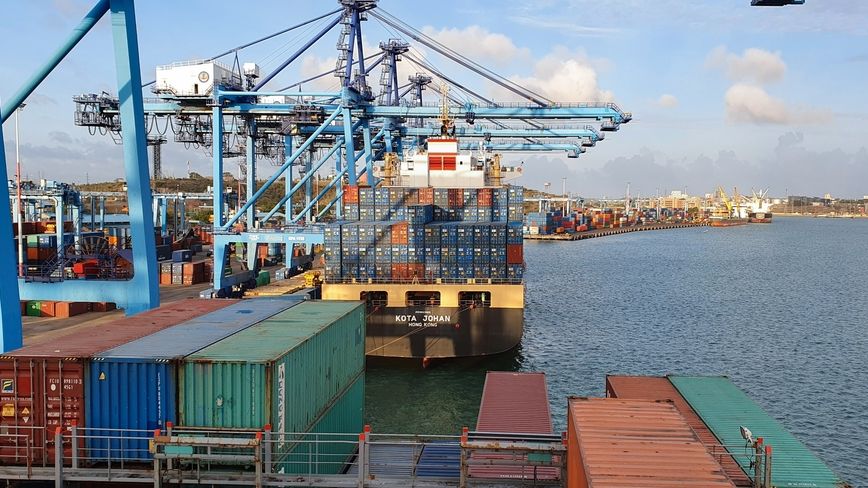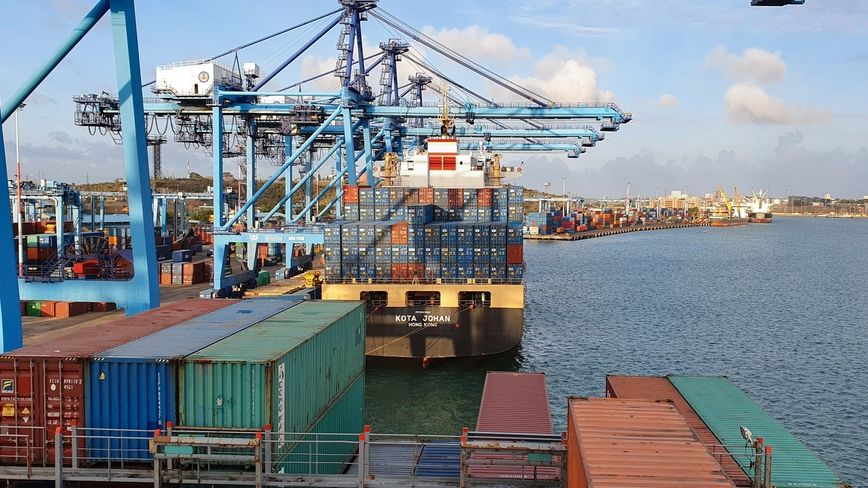Kenya’s principal maritime gateway, the Port of Mombasa, has announced a 10.9 percent rise in cargo volumes for the year 2025, handling 45.45 million metric tonnes compared to 40.99 million metric tonnes in 2024. This performance has been described by the Kenya Ports Authority (KPA) as indicative of renewed momentum in regional commerce and underscores the port’s enduring significance within Africa’s maritime economy.
William Ruto, the KPA’s Managing Director, noted in a formal statement that container traffic increased by 5.5 percent to reach 2.11 million twenty-foot equivalent units (TEUs), rising from 2 million TEUs the previous year. The uptick in activity was not confined to containerised cargo, with a substantial growth observed in transit volumes, which escalated to 15.88 million metric tonnes. This reflects a 19.5 percent increase from the 13.29 million metric tonnes recorded in 2024.
The expansion in transit trade has been driven by increased utilisation of the corridor by neighbouring countries. Uganda, which remains Mombasa’s largest inland market, saw a 25.2 percent rise in cargo throughput. The Democratic Republic of the Congo recorded a 16.5 percent increase, Rwanda 22.8 percent, and Tanzania 11 percent. These figures collectively reflect a recalibration of regional logistics preferences, with Mombasa continuing to anchor the Northern Corridor as a preferred trade route for landlocked states in the East and Central African subregion.

This year’s performance reinforces the port’s evolving role in a more integrated and intra-connected continental trade narrative. In a region increasingly characterised by infrastructural agency and economic self-determination, the figures reflect less a singular national achievement and more the consequences of deliberate regional policy coordination. Kenya, through its port infrastructure, positions itself not merely as a transit hub but as an active participant in shaping the future of African trade systems.
The KPA also reported growth at all of its facilities, with the Port of Lamu exhibiting the most notable improvement. From handling 74,380 metric tonnes in 2024, Lamu managed 799,161 metric tonnes in 2025. The authority processed 55,687 TEUs through the facility, with containerised cargo emerging as the primary driver. This signals a shift in the functionality of the Lamu Port from aspirational infrastructure to a concrete contributor to regional trade flows. According to the KPA, increased scheduling by international shipping lines at Lamu is expected to further boost throughput in the coming years.
In response to this growth, the KPA has confirmed ongoing investments into infrastructural development with a focus on sustainability and capacity expansion. Kenya recently unveiled an ambitious and comprehensive plan to dramatically improve the efficiency and operational speed of the Port of Mombasa through a strategic partnership between the Kenya Ports Authority (KPA) and the Kenya Revenue Authority (KRA).
The landmark agreement is expected to significantly ease chronic congestion, accelerate cargo clearance processes, and strengthen coordination among the multiple government agencies responsible for handling imports and exports through East Africa’s busiest seaport.
A detailed statement outlined specific actions that will be implemented to reduce congestion, improve operational efficiency, and modernize customs procedures at the port. These measures represent a comprehensive approach addressing multiple bottlenecks that have historically plagued Mombasa Port operations.

Among the most significant and transformative measures is the strategic relocation of long-stay containerized cargo from the main port facilities to licensed customs facilities located outside the port area. This initiative directly addresses one of the primary causes of port congestion—containers that remain at the port for extended periods, occupying valuable space and impeding the flow of new cargo.
“Cargo destined for Mombasa will be transferred to Container Freight Stations (CFSs) for clearance, while that headed to Nairobi and upcountry regions will be railed to the Nairobi Inland Container Depot (ICD),” the official statement detailed, outlining the geographical distribution strategy for cargo movement.
This differentiated approach recognizes that different cargo types and destinations require different handling strategies. By moving Mombasa-destined cargo to nearby CFSs and utilizing rail transport to move inland-bound cargo to the Nairobi ICD, the plan simultaneously decongests the port while promoting more efficient, environmentally sustainable cargo distribution using Kenya’s expanding rail infrastructure.
Cargo destined for Uganda and other countries in the East African region will now be cleared at the Naivasha ICD, a strategic facility positioned along the Standard Gauge Railway corridor. This represents a significant operational shift that should reduce transit times for regional cargo while positioning Kenya as a more competitive regional logistics hub.
The agencies plan to substantially improve scanning procedures by allowing containers heading to Container Freight Stations to be transferred immediately after the physical scanning process, with image analysis and verification completed subsequently. This procedural change is expected to save considerable time while maintaining effective monitoring and security standards.
This represents a shift from sequential to parallel processing, where physical movement and analytical verification occur concurrently rather than consecutively. Modern imaging technology and data management systems make this approach feasible, allowing experienced analysts to review scan images remotely while containers physically move to their next destination.
KRA is also preparing to roll out a new Pre-Arrival Processing (PAP) system, which represents a fundamental shift in customs clearance procedures. This system will allow importers to complete documentation and clearance processes before cargo physically arrives in Kenya, dramatically reducing the time cargo spends in port after arrival.
Pre-arrival processing is considered international best practice in modern customs administration. By allowing importers to submit documents, pay duties, and receive clearance approval while cargo is still in transit, the system eliminates waiting periods after arrival. Upon physical arrival, pre-cleared cargo can move almost immediately to its destination, subject only to verification that the physical cargo matches declared documentation.
In the long term, the participating agencies have committed to integrating all port-related systems to enable seamless digital coordination and real-time data sharing. This systems integration represents perhaps the most transformative element of the entire initiative, as it addresses the fundamental inefficiency of multiple disconnected systems requiring duplicate data entry and manual coordination.
The Port of Mombasa stands as one of the most economically important facilities in East and Central Africa, functioning as the primary maritime gateway for Uganda, Rwanda, Burundi, South Sudan, and the Democratic Republic of Congo—all landlocked countries dependent on coastal access for international trade. Kenya’s Northern Corridor transport network, connecting Mombasa to these interior markets, handles hundreds of thousands of containers annually.
The economic implications of port efficiency extend far beyond Kenya’s borders. When Mombasa Port operates efficiently, goods reach Kampala, Kigali, and Bujumbura faster and cheaper, reducing costs for businesses and consumers across the region. Conversely, inefficiency at Mombasa ripples through regional supply chains, increasing costs and reducing competitiveness for the entire East African Community.
This regional dimension creates both opportunities and responsibilities for Kenya. Efficient port operations enhance Kenya’s position as the natural economic hub for East Africa, attracting regional businesses to locate operations in Kenya and positioning Kenyan firms as preferred suppliers. However, persistent inefficiency could drive cargo to alternative routes, such as Tanzania’s Dar es Salaam-based Central Corridor, which actively competes for transit traffic to landlocked countries.
Kenya has also invested in port expansion at Mombasa, including construction of additional berths and acquisition of modern cargo handling equipment. The second container terminal, featuring modern gantry cranes and expanded storage areas, has increased capacity but also created imperative to improve cargo evacuation systems to prevent the new capacity from simply shifting congestion from one part of the port to another.
The Kenya initiative draws on international best practices in port management and customs administration. Leading ports worldwide have achieved dramatic efficiency improvements through similar approaches combining infrastructure investment, process reengineering, technology deployment, and stakeholder coordination.
Kenya’s initiative, if successfully implemented, could position Mombasa among the world’s better-performing emerging market ports, attracting increased cargo volumes and enhancing Kenya’s competitiveness as a manufacturing and logistics location. However, achieving this potential requires sustained commitment beyond the initial announcement and celebration.

The expected outcomes of the decongestion initiative are substantial. Reduced dwell times translate directly into cost savings for importers and exporters, as cargo spends less time accumulating storage charges and tied up capital is released more quickly. Faster clearance makes Kenyan businesses more competitive by reducing input costs and enabling faster response to market opportunities.
Enhanced port efficiency should reduce the infamous “cost of doing business” in Kenya, a frequent complaint from domestic and international investors. The World Bank’s Doing Business indicators have historically rated Kenya poorly on trading across borders metrics, partly reflecting port and customs inefficiencies. Improvements in these areas could substantially enhance Kenya’s investment attractiveness.
For the government, more efficient cargo processing should actually enhance revenue collection despite storage fee waivers. Faster processing reduces incentives for tax evasion, as the cost of legitimate clearance decreases. Reduced corruption opportunities, as automation and transparency increase, should ensure that collected revenues actually reach government coffers rather than being diverted.
These developments arrive amid broader continental efforts to reshape trade corridors through projects such as the African Continental Free Trade Area (AfCFTA), which seeks to reduce intra-African trade barriers. Within this context, Kenya’s maritime assets become pivotal in supporting continental supply chains, not merely for East Africa but for the wider Pan African logistical grid. That both Mombasa and Lamu have recorded measurable growth points to the effectiveness of long-term infrastructural planning, regional collaboration, and the strategic recalibration of port operations toward African development imperatives.
Far from a narrative of dependence, the performance of Kenya’s ports speaks to an evolving African capability to define, execute, and manage its own trade architecture. The emphasis by the KPA on reliability and infrastructure-driven trust affirms the view that African ports, once peripheral in global logistics chains, are transitioning into central nodes of a dynamic intra-continental system.
The 2025 performance highlights Kenya’s steady progress in strengthening its maritime and logistics sector. Sustaining this momentum, however, will depend on continued infrastructure investment, deeper regional integration, and a stronger push to boost exports and value addition. If these elements align, Kenyan ports could play an even more transformative role in driving economic growth and regional trade in the years ahead.



















